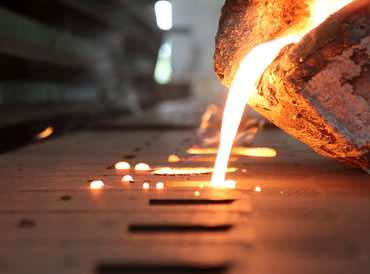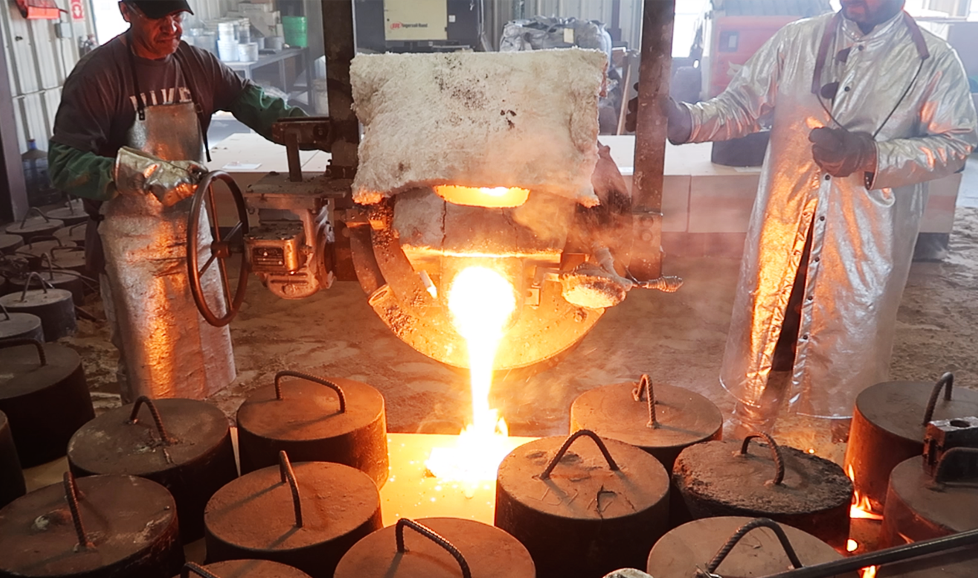Why a Metal Foundry Combines Technology and Craftsmanship
Wiki Article
A Comprehensive Guide to Metal Casting: Benefits and Providers Used by Foundries
Metal casting is an important process in various markets, offering countless advantages through the services of shops. These facilities transform molten metal right into long lasting and specific parts, dealing with specific client needs. By utilizing innovative technologies, factories ensure top quality and performance in manufacturing. Nonetheless, the ins and outs of metal casting and the varied methods entailed raise important inquiries concerning its role in contemporary production. What developments lie in advance in this vital field?Recognizing the Metal Casting Process
The metal casting procedure is an essential method used in making to produce complex shapes and components. This technique entails putting molten metal into a mold and mildew created to create the preferred things. The procedure begins with pattern creation, which functions as a theme for the mold. Aluminum Foundry. Numerous materials, such as sand, metal, or ceramic, are used for mold-making, depending on the details demands of the casting
As soon as the mold and mildew is prepared, liquified metal is put right into it and permitted to cool down and solidify. After solidification, the mold is gotten rid of, disclosing the cast part. Different strategies, consisting of sand casting, financial investment casting, and pass away casting, are employed, each fit to various applications and materials. Quality control measures, such as examinations and testing, are necessary to assure the final product fulfills specs. In general, the metal casting procedure plays a crucial function in generating parts for markets ranging from automobile to aerospace.
Secret Perks of Metal Casting
Metal casting provides substantial benefits that make it a preferred production approach in different industries. Its design adaptability and accuracy permit complex forms, while cost-efficient automation boosts efficiency. Furthermore, the convenience and strength of products utilized in casting add to the longevity of the end products.Design Flexibility and Precision
Releasing amazing style adaptability and precision, metal casting permits developers and designers to create elaborate forms and functions that would certainly be impossible or difficult to attain with various other manufacturing techniques. This capacity makes it possible for the production of intricate geometries, internal structures, and fine information that enhance product capability and aesthetic appeals. Additionally, different casting methods, such as sand casting, financial investment casting, and pass away casting, supply additional alternatives for customization, accommodating diverse material buildings and project demands. The flexibility of molds allows alterations throughout the layout stage, streamlining the shift from concept to final item. Inevitably, metal casting stands out for its ability to deliver high-precision components, making it an indispensable process in markets ranging from automotive to aerospace and beyond.Cost-Effective Mass Manufacturing
Cost-efficient automation stands as one of the key benefits of metal casting, allowing producers to produce huge amounts of parts at a lower cost per unit. This efficiency arises from the capacity to produce complex molds that can be reused numerous times, substantially minimizing configuration and operational costs. In addition, metal casting procedures, such as sand casting and pass away casting, enable for high throughput, making it possible to satisfy the demands of large-scale manufacturing runs. The minimized material waste and energy intake further boost price savings, making metal casting an attractive alternative for markets needing mass elements. Overall, the cost-effective nature of metal casting placements it as a favored method for makers going for financial efficiency in their manufacturing processes.Product Flexibility and Toughness
One of the standout features of metal casting is its amazing product flexibility, which permits for making use of a vast array of metals and alloys. This adaptability makes it possible for producers to select products that best fit their details applications, from aluminum and bronze to iron and steel. Each metal offers distinct residential properties, including differing degrees of toughness, corrosion resistance, and thermal conductivity. Metal casting can produce elements that fulfill strict efficiency needs across diverse markets, such as auto, aerospace, and construction. Furthermore, the toughness of cast metals can be boosted with numerous treatment processes, making certain longevity and long life. Metal Foundry. Overall, the combination of material flexibility and fundamental stamina makes metal casting a favored option for creating top notch elementsKinds of Metal Casting Methods
Metal casting incorporates a variety of methods that deal with various production needs and product residential or commercial properties. Common techniques include sand casting, which utilizes a sand mold and mildew for complicated forms, and financial investment casting, recognized for its accuracy and surface finish. Pass away casting is an additional method that utilizes high-pressure injection of liquified metal right into molds, ideal for mass production of tiny components.Shell molding offers a much faster different, utilizing a resin-coated sand to create thin-walled mold and mildews, while shed foam casting enables elaborate layouts without the demand for a core.
Furthermore, continuous casting is utilized for generating lengthy sections of metal, such as bars or sheets, by strengthening liquified metal in a constant process. Each technique offers unique advantages and is picked based upon variables like the called for information, production volume, and product kind, making sure premium results in metal fabrication across various sectors.
The Duty of Foundries in Metal Casting
Shops play a pivotal role in the metal casting process, functioning as the centers where liquified metal is transformed into completed products. These specialized facilities are geared up with the essential tools and modern technologies to take care of different metals, making certain high-grade results. Foundries are in charge of several important functions, including melting the metal, putting it into mold and mildews, and enabling it to solidify.In addition, they maintain rigorous security and ecological requirements to protect employees and minimize eco-friendly impact. Proficient technicians and engineers team up to maximize casting processes, enhancing effectiveness and lowering waste. Factories additionally participate in quality assurance measures, making sure that the end products fulfill specific resistances and requirements. This top quality assurance is crucial for industries that count on accurate elements, such as vehicle and aerospace. Therefore, shops add substantially to the total production landscape, making it possible for technology and development throughout numerous fields.
Personalized Metal Casting Providers
Personalized metal casting solutions supply customized style services that satisfy details customer needs. These solutions likewise offer material option proficiency, guaranteeing the right metal is picked for the preferred application. Such flexibility and expertise improve the overall top quality and efficiency of the find this final product.
Customized Layout Solutions
Customized layout remedies in metal casting offer suppliers with the flexibility to develop components that satisfy specific performance and visual demands. Foundries provide personalized solutions that allow customers to define dimensions, shapes, and surface finishes to attain wanted results. This modification process typically includes collaboration between designers and developers, ensuring that the end products line up with operational demands and industry criteria. Advanced innovations, such as computer-aided style (CAD) and simulation software application, make it possible for precise modeling and testing of elements prior to manufacturing, boosting and decreasing mistakes performance. By leveraging customized layout remedies, companies can maximize performance while reducing waste and expenses, inevitably causing a much more one-upmanship in the marketplace. This versatility is crucial for sectors needing special applications and requirements.Product Option Know-how
When selecting products for metal casting, experience plays an essential duty in ensuring that the best option lines up with both performance requirements and cost-effectiveness. Shops use competent experts that recognize the residential properties of various steels and alloys, allowing them to suggest excellent products for specific applications. Elements such as toughness, rust resistance, and thermal conductivity are meticulously considered to satisfy the client's demands. Additionally, market trends and advancements in material science inform these choices, allowing shops to remain affordable. By leveraging their competence, factories can assist customers in steering via complex product options, eventually bring about boosted item top quality and decreased production costs. This customized knowledge is vital for accomplishing successful results in custom-made metal casting services.Quality Control in Metal Casting
Quality assurance in metal casting is vital to guarantee that the final items meet the required specifications and efficiency requirements. Shops use a range of techniques and methods to assure the finest quality of actors elements. This process begins with rigorous material assessments, verifying that basic materials abide by sector criteria. Throughout the casting procedure, real-time monitoring and testing are conducted to analyze specifications such as temperature level, mold and mildew stability, and dimensional accuracy.
Applications of Metal Castings Across Industries
Metal castings play an essential duty in various markets, working as the backbone for countless applications. In the automobile field, cast elements such as engine blocks and transmission real estates are essential for car performance and integrity. The aerospace industry counts on precision castings for important parts that navigate here guarantee safety and security and effectiveness in flight. Additionally, the building and construction sector uses metal castings for fixtures, fittings, and architectural aspects, enhancing the longevity of buildings and facilities.Moreover, the energy market gain from castings made use of in turbine blades and various redirected here other equipment essential for power generation - Aluminum Foundry. The clinical area likewise uses metal castings in tools and devices, showing the flexibility of this manufacturing procedure. Overall, metal castings are essential to the capability and advancement of diverse markets, showcasing their importance in modern innovation and infrastructure advancement
Regularly Asked Concerns
What Materials Are Generally Used in Metal Casting?
Common products used in metal casting include light weight aluminum, iron, brass, steel, and bronze. Each material supplies unique residential or commercial properties ideal for different applications, allowing suppliers to pick the very best alternative based upon weight, stamina, and deterioration resistance.How Long Does the Metal Casting Process Generally Take?
The metal casting process typically takes a number of hours to a couple of days, depending on aspects such as the intricacy of the layout, kind of metal used, and the specific casting technique used by the shop.
What Is the Ecological Influence of Metal Casting?
The environmental impact of metal casting includes power usage, emissions, and waste generation. Shops typically execute measures to reduce these results, such as reusing products and utilizing cleaner innovations to decrease their ecological footprint.Can Metal Casting Be Done for Small-Scale Projects?
Metal casting can certainly be performed for small-scale jobs. Numerous factories cater to such needs, offering customized solutions that accommodate minimal production runs while preserving top quality and precision in the end products.What Are the Safety Measures in Metal Casting Foundries?
In metal casting shops, precaution consist of personal protective devices, proper ventilation, training on devices usage, emergency situation treatments, routine upkeep checks, and adherence to sector safety and security criteria to decrease risks connected with molten metal and hazardous materials.Additionally, metal casting processes, such as sand casting and die casting, permit for high throughput, making it viable to meet the demands of massive production runs. One of the standout characteristics of metal casting is its impressive product versatility, which allows for the use of a large range of steels and alloys. Furthermore, continuous casting is made use of for creating long sections of metal, such as sheets or bars, by strengthening liquified metal in a constant process. Shops play a crucial role in the metal casting procedure, serving as the facilities where molten metal is transformed into ended up items. Common products utilized in metal casting include aluminum, iron, brass, steel, and bronze.
Report this wiki page